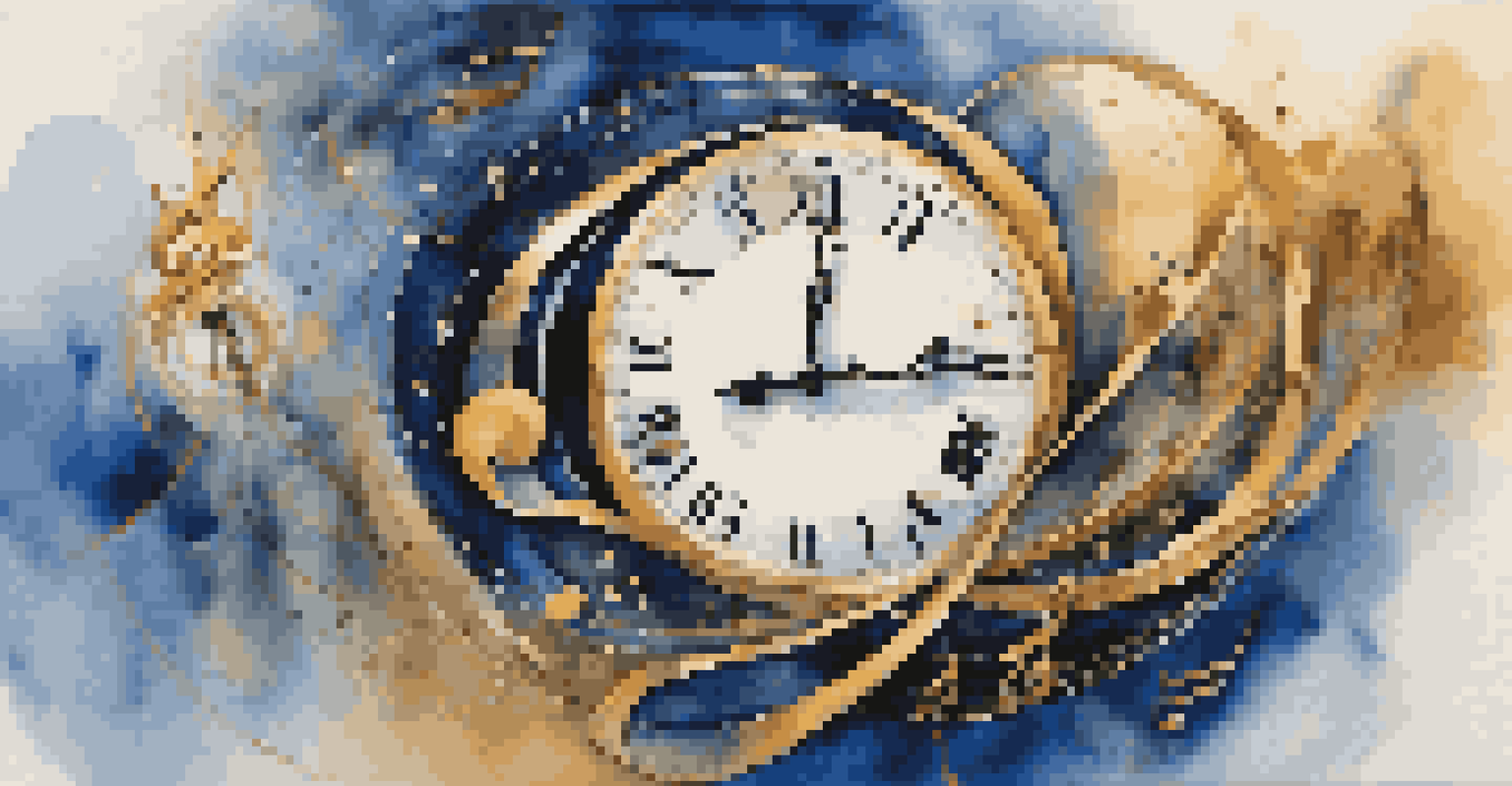Music, Rhythm, and the Psychological Experience of Time

Understanding the Connection Between Music and Time
Music has a unique ability to manipulate our perception of time. When we listen to a favorite song, it can feel both fleeting and eternal, creating a sense of nostalgia or urgency. This phenomenon is deeply rooted in how our brains process sound, rhythm, and duration.
Music can change the world because it can change people.
One way music influences our perception is through tempo. Fast-paced music can make time feel like it's flying, while slower melodies can stretch moments into eternity. Think about the last time you were at a concert, lost in the rhythm; hours can pass in what feels like minutes.
Additionally, music often serves as a backdrop for our life experiences, marking significant moments like celebrations or mourning. These emotional associations with certain songs can further distort our perception of time, making us feel as though time stands still during meaningful musical moments.
The Science Behind Rhythm and Time Perception
Rhythm plays a crucial role in how we perceive time, acting as a framework that organizes our experiences. Studies show that our brain's internal clock is influenced by rhythmic patterns, which can alter our sense of duration. For example, a steady beat can help us anticipate when the next note or event will occur.

This synchronization with rhythm can lead to a phenomenon called 'temporal attraction,' where our perception of time aligns with the musical beat. Imagine tapping your foot to a catchy tune; your body naturally synchronizes with the rhythm, making time feel more predictable and enjoyable.
Music Shapes Our Time Perception
Music significantly influences how we perceive time, making moments feel either fleeting or eternal.
Moreover, research indicates that engaging with rhythmic music can enhance cognitive functions, such as memory and attention. This connection between rhythm and our mental processes showcases how deeply intertwined music and the psychological experience of time truly are.
Cultural Variations in Music and Time Experience
Different cultures perceive and use music in diverse ways, influencing their experience of time. For instance, some cultures emphasize cyclical rhythms, which can create a sense of timelessness, whereas others may focus on linear structures that highlight the progression of time.
Time flies over us, but leaves its shadow behind.
Take African drumming, for example; its polyrhythmic nature often leads to a communal experience where time seems to dissolve. Participants in such musical gatherings may feel an altered state of consciousness, where the boundaries of past, present, and future blur.
In contrast, Western classical music often follows a more structured and linear approach, reflecting the societal values of progress and order. This variation in musical styles not only shapes cultural identity but also alters how people within those cultures experience the passage of time.
Music's Role in Altering Emotional Time Perception
Emotions play a pivotal role in how we perceive time while listening to music. Upbeat songs can boost our mood and make time feel like it’s racing, while melancholic tunes often slow our perception down, inviting reflection and contemplation. This emotional connection adds a rich layer to our experience of time.
Consider how a heart-wrenching ballad can evoke memories of lost love, making moments feel more poignant and stretched. The emotional weight of music can create a lingering sense of time, as we find ourselves reminiscing about past experiences tied to that melody.
Rhythm Enhances Cognitive Function
Engaging with rhythmic music can boost cognitive abilities such as memory and attention.
Furthermore, therapeutic uses of music, such as in music therapy, highlight its power to influence emotional states and, consequently, our perception of time. Clients often report feeling more present and in tune with their emotions, emphasizing the profound connection between music, emotion, and time.
The Impact of Technology on Music and Time Experience
In the digital age, technology has transformed how we create and consume music, further influencing our experience of time. Streaming services allow us to access a vast array of music instantly, changing how we relate to time and to each song. Instead of waiting for a favorite track to come on the radio, we can have it at our fingertips.
This immediacy can lead to a phenomenon known as 'time compression,' where our sense of time is altered due to constant access to new music. Listeners may find themselves skipping through songs at a rapid pace, creating a fragmented experience that challenges our traditional notions of musical duration.
Moreover, technology has enabled the rise of genres like lo-fi and chillhop, which often embrace slower tempos and repetitive patterns. These styles reflect a desire to slow down and savor the moment, illustrating how music continues to shape our perception of time in today’s fast-paced world.
Music Therapy: Harnessing Rhythm for Time Awareness
Music therapy has emerged as a powerful tool for enhancing our awareness of time, particularly in therapeutic settings. By engaging clients with rhythmic activities, therapists can help them reconnect with their emotional states and improve their sense of time. This method proves especially valuable for individuals dealing with anxiety or trauma.
In music therapy sessions, participants might engage in drumming or listening to specific types of music that encourage mindfulness. These activities foster a heightened awareness of the present moment, allowing clients to experience time in a more meaningful way.
Technology Alters Music Experience
The rise of digital platforms has transformed our relationship with music, leading to a fragmented experience of time.
Additionally, rhythmic exercises can aid in cognitive rehabilitation, helping individuals regain a sense of temporal structure following brain injuries. Through the integration of music, therapy not only addresses emotional needs but also enhances the psychological experience of time.
The Future of Music and Our Perception of Time
As we look to the future, the intersection of music, rhythm, and our experience of time will likely continue to evolve. Advances in artificial intelligence and virtual reality are poised to change how we create and experience music, potentially leading to new ways of perceiving time. Imagine immersing yourself in a musical landscape where you can interact with sound in real-time.
Such innovations may allow for personalized musical experiences that adapt to our emotional states, further altering our perception of time. This could lead to a more profound connection between music and our memories, as we curate playlists that resonate with specific moments in our lives.

Moreover, the ongoing exploration of music's psychological effects will deepen our understanding of how rhythm and melody shape our experience of time. As we navigate this musical journey, one thing remains clear: music will always have a unique ability to manipulate our perception of the passage of time.